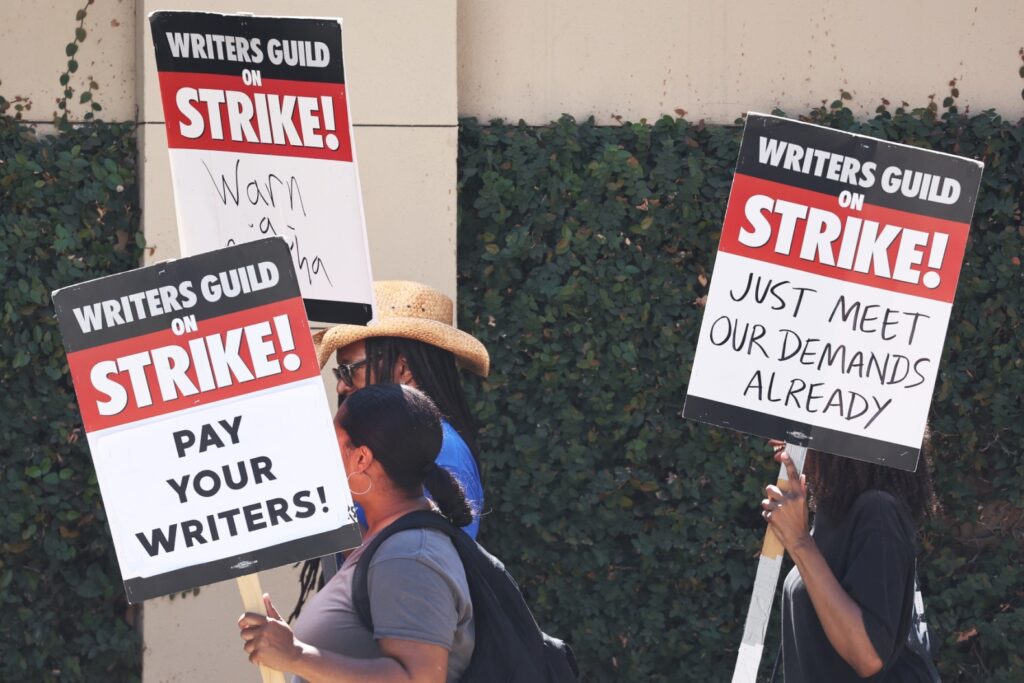Writers Guild and studios reach tentative agreement to end Hollywood strike
The WGA began its strike on May 2, forcing many major productions to cease operations

The Writers Guild of America (WGA) and the Alliance of Motion Picture and Television Producers (AMPTP) have reached a tentative agreement after more than five months of bitter and stalled negotiations.
“We have reached a tentative agreement on a new 2023 MBA, which is to say an agreement in principle on all deal points, subject to drafting final contract language,” the WGA Negotiating Committee wrote to its members in a letter shared with Rolling Stone on Sunday. “What we have won in this contract — most particularly, everything we have gained since May 2nd — is due to the willingness of this membership to exercise its power, to demonstrate its solidarity, to walk side-by-side, to endure the pain and uncertainty of the past 146 days. It is the leverage generated by your strike, in concert with the extraordinary support of our union siblings, that finally brought the companies back to the table to make a deal.”
A rep for WGA said the organisation had no further comment.
In the letter, the WGA called the deal “exceptional” and emphasised that it included “gains and protections” for its membership. It also called for patience as the deal is finalised.
“What remains now is for our staff to make sure everything we have agreed to is codified in final contract language. And though we are eager to share the details of what has been achieved with you, we cannot do that until the last ‘I’ is dotted. To do so would complicate our ability to finish the job. So, as you have been patient with us before, we ask you to be patient again — one last time.”
The tentative three-year deal needs to pass a number of votes before ratification: It will first go to the union’s negotiating committee for a vote, and then it must be approved by the WGA West’s board and the WGA East’s council. If it is approved via those leadership votes, members will then be able to vote to ratify the contract. In the letter, the organisation emphasised that while it is suspending WGA picketing, this isn’t a green light to return to work, instead encouraging the membership to join the SAG-AFTRA picket lines, as the actors’ union continues its strike.
Hollywood execs had been meeting with negotiating teams for both sides, and an offer was reportedly made on Saturday that appeared to mark the parties were nearing the finish line. But by Saturday evening, they had not reached an agreement.
In a joint statement released on Saturday night, the AMPTP and WGA said, “The WGA and AMPTP met for bargaining on Saturday and will meet again on Sunday.”
According to Deadline, a meeting last week included Netflix CEO Ted Sarandos, Disney CEO Bob Iger, Warner Bros. Discovery CEO David Zaslav, and Universal chief content officer Donna Langley, AMPTP president Carol Lombardini and WGA chief negotiator Ellen Stutzman.
Following the initial meeting, two WGA and AMPTP later released a joint statement saying only that they “met for bargaining today and will meet again tomorrow.”
On March 20, the WGA entered into contract discussions with the AMPTP, which represents Hollywood studios and streamers, and failed to agree on negotiations by the May 1 deadline. On May 2, for the first time since 2007 (before the birth of streaming giants Netflix, Hulu, Disney+, and HBO Max), WGA members went on strike, forcing many major productions to cease operations.
Included in the WGA demands were an increase in viewership-based residuals, an increase in the minimum compensation in all areas of media for writers, an increase in contributions to pension and health care plans, and minimum staffing levels.
One of the major points on contention surrounded the regulation of the use of artificial intelligence (AI). The WGA had initially requested that “AI can’t write or rewrite literary material,” “can’t be used as source material,” and that “MBA-covered material can’t be used to train AI,” the fear being that AI could generate drafts of screenplays and then hire writers at day rates to fine tune those scripts. The AMPTP rejected the proposal at the time, instead offering merely to hold “annual meetings to discuss advancements in technology.”
Last month, AMPTP released details of a contract offer presented to the WGA on Aug. 11. In the released proposal, the AMPTP outlined a 13 percent wage increase over a three-year contract, a 15 percent increase in minimum weekly rates, and rights from AI-produced material, but left open a potential loophole that could lead to copyrightable scripts produced by AI with human help.
Writers fired back at the flawed counteroffer, and highlighted a number of areas where in their eyes, AMPTP’s proposal fell short.
The Wire creator David Simon criticised the counterproposal on X, (formerly known as Twitter), writing, “Read it in detail. On every one of five essential issues for which the AMPTP claims a concession in large print, there is, in smaller print, an equivocation that wipes the concession away. It’s why this ‘final offer’ isn’t remotely acceptable to our union.”
In a letter earlier this month, the WGA Negotiating Committee suggested that studios might have to break from the AMPTP and its “paralysis,” stating that they’ve had productive conversations with separate studio executives who seem willing to negotiate.
“The companies know the truth: they must negotiate if they want to end the strike. They may not like it —they may try to obscure it — but they know it,” the statement read. “While they wrestle with that fact and with each other, they will continue attempting to get writers to settle for less than what we need and deserve, and encourage us to negotiate with ourselves. But we are not going to do that.”
